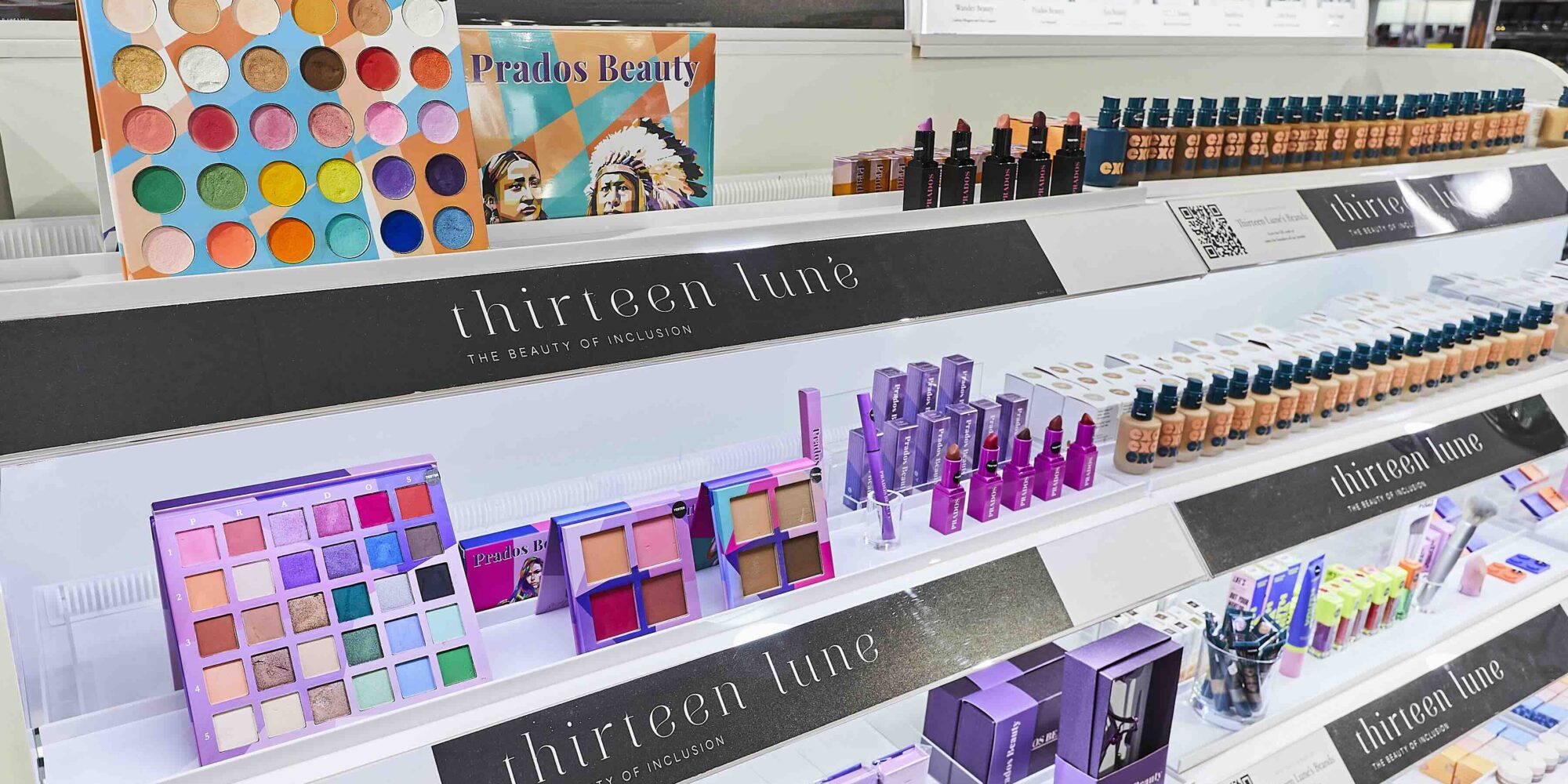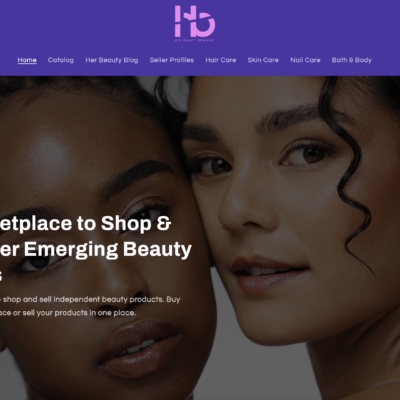
J.C. Penney Ends Thirteen Lune Shop-In-Shop Partnership
J.C. Penney has ended a partnership with inclusive retailer Thirteen Lune that brought minority-owned brands to over 600 of its stores, but was challenged by Thirteen Lune’s financial difficulties that led to participating brands not getting compensated.
Thirteen Lune’s shop-in-shop branding disappeared from J.C. Penney’s beauty departments about a month ago. However, a landing page for its partnership with J.C. Penney continues to be on the retailer’s website with products from brands listed at steep discounts. The termination of the partnership comes after a rocky period for Thirteen Lune. It underwent a transfer of ownership in an assignment for the benefit of creditors process, an alternative to bankruptcy, in December last year.
Preceding the transfer of ownership, the financial arrangement between J.C. Penney and Thirteen Lune was converted into a licensing deal in July last year, according to publication The Business of Fashion. The deal cut out Thirteen Lune’s previous role purchasing products from brands and paying their invoices.
In a statement provided to Beauty Independent, a J.C. Penney spokesperson said, “We are very proud of the strides JCPenney Beauty has made in bringing awareness to and accelerating growth of BIPOC- and female-founded brands across the industry, and we remain committed to maintaining great partnerships with all of our brands. In 2024, JCPenney and Thirteen Lune came to the mutual decision to change our working relationship such that JCPenney purchases directly from the brands. JCPenney is no longer working with Thirteen Lune and will continue to work directly with the brands that we have been carrying at JCPenney Beauty through our established vendor relationships.”
J.C. Penney’s decision to sever ties with Thirteen Lune leaves the struggling department store company without a retailer as a strategic beauty partner for the first time in almost 20 years. Thirteen Lune’s fall 2021 arrival at J.C. Penney with roughly 50 brands in 10 pilot locations resulted from its efforts to revamp its beauty departments as its partnership with Sephora, which went from 2006 to 2022, was winding down. Sephora replaced J.C. Penney with Kohl’s, where it began opening in-store shops in 2021.
Thirteen Lune’s partnership with J.C. Penney became strained when it expanded to around 600 of the retailer’s 650-plus locations with 32 brands in the spring of 2023. For the small inclusive retailer focused primarily on small brands, the expansion was daunting. In a lawsuit filed on March 4 by Thirteen Lune investors Beauty Generations Fund and Relevance Capital against Thirteen Lune co-founder Nyakio Grieco, the retailer’s new owner SNR Capital, a financing and fulfillment firm affiliated with beauty distributor The PCA Companies, and others to contest the transfer of ownership, it details that Thirteen Lune’s revenues declined from $24 million in 2023 to $7 million in 2024.
Today, Thirteen Lune maintains an e-commerce platform listing nearly 160 brands in its assortment, a Los Angeles store and sun care and skincare brand Relevant: Your Skin Seen. A number of brands it carried have closed, including Mora Cosmetics, The Established, Mintty Makeup and LipLoveLine. Prior to its sale to SNR Capital, Thirteen Lune raised $12.5 million in funding from celebrity investors and venture capital firms like Sean Combs, Gwyneth Paltrow, Naomi Watts, Fearless Fund, Capstar Ventures and BrainTrust.

As it bled revenue, Thirteen Lune fell behind on vendor payments. Although SNR has vowed to make brands due money from the retailer whole, several haven’t recouped what they’re owed. In a TikTok video posted April 8, beauty influencer Manuel Gutierrez Jr., better known as MannyMua, revealed Thirteen Lune owes his makeup brand Lunar Beauty $50,000.
“Once the brands reached store shelves, it became clear that the execution was new territory for everyone involved, and there was naturally a learning curve,” says Cece Meadows, founder and CEO of Prados Beauty, a makeup brand that entered J.C. Penney with Thirteen Lune and has stayed on at J.C. Penney post-Thirteen Lune. “Many brands, including ours, may have had expectations shaped by the excitement and ambition surrounding the project.”
Jenn Harper, founder and CEO of Cheekbone Beauty, another makeup brand that launched at J.C. Penney as part of the Thirteen Lune partnership that’s still sold at J.C. Penney, agrees that Thirteen Lune didn’t have the operational prowess to properly execute its partnership with J.C. Penney and mentions the two partners weren’t communicating effectively. She recalls a meeting with J.C. Penney buyers where they informed her Cheekbone would be in Thirteen Lune’s shop-in-shop collection for six months after she had signed on with Thirteen Lune to have the brand be in it for a year.
Cheekbone nearly got stuck with a $1.2 million return-to-vendor shipment when J.C. Penney tried to pull the brand from stores last year. Pointing to the year-long contract that Cheekbone signed with Thirteen Lune, the brand negotiated with the retailer to stay in 150 doors. J.C. Penney then absorbed the brand’s excess inventory.
“I fully believe J.C. Penney assumed Thirteen Lune could come in and do what Sephora did.”
“There’s a complete disconnect between what Thirteen Lune was doing. I fully believe J.C. Penney assumed Thirteen Lune could come in and do what Sephora did, not even understanding the behemoth and the business behind what Sephora does,” says Harper, adding, “If we had to get a return of all of that product, that would’ve put us out of business that year.”
J.C. Penney’s breakup with Thirteen Lune has happened as retailers such as Target, Amazon and Walmart roll back diversity, equity and inclusion efforts. The chain’s Thirteen Lune tie-in manifested in the opposite environment, when retailers were enacting DEI programs in the wake of the Black Lives Matter protests reacting to the murder of George Floyd, police brutality and racial injustice. Although factors in J.C. Penney’s separation from Thirteen Lune are unrelated to DEI, it occurring amid the broader DEI retreat could compound the already formidable barriers for BIPOC beauty brands.
Teresa Romano, an advisor for BIPOC brands that works with Cheekbone Beauty on its J.C. Penney partnership, believes the issues retailers face attempting to cultivate small minority-brands aren’t limited to J.C. Penney. “They don’t know how to manage BIPOC brands, how to get them to scale, how to get that customer to come to the store. Sephora doesn’t know how to do it. Ulta doesn’t know how to do it. Thirteen Lune doesn’t know how to do it. J.C. Penney doesn’t know how to do it,” she says, specifying, “One of the biggest missteps is that they are very focused on top up, on the executives, when they should have been more targeted towards the community. Create a forum, have these BIPOC founders come in.”
J.C. Penney faces an uphill battle as it seeks to captivate contemporary beauty shoppers. Amazon and TikTok Shop are becoming more powerful players in the category, and beauty specialty retailers like Sephora and Ulta Beauty have grabbed attention and dollars from department stores with ever-shrinking market share. According to data from data analytics company GlobalData in the publication Retail Wire, department stores’ share of American retail sales dropped from 14.1% in 1993 to 9.8% in 2003. Ten years later, department stores accounted for 5.7% of U.S. retail sales. Last year, that figure stood at 2.6%.

Susannah Dellinger, founder and CEO of beauty retail field sales agency Bright Beauty Collective, says, without the excitement J.C. Penney’s Thirteen Lune partnership brought to its beauty departments, they feel dated. Nonetheless, she doesn’t conclude that J.C. Penney should promptly pin down a different partner. “They need a platform model,” she says. “Curate emerging brands. Empower regional creators. Build the loyalty loop themselves. The next winners in beauty aren’t just selling products, they’re selling discovery, belonging and identity.”
She elaborates, “Rotate brands and creators regionally so shopping feels fresh, personal and culturally connected, not cookie-cutter corporate. What J.C. Penney should be aiming for is the ground between Target and TikTok Shop, affordable but with a sense of discovery.”
Harper isn’t sure J.C. Penney is equipped to sell indie beauty brands. “It has to be managed, and there has to be a ton of education and there has to be a ton of marketing around it constantly,” she says. “If they’re just going to stick with the model that they have…I’d just put a little mini drugstore section in there and leave that with the classics.”
Last year, J.C. Penney’s third quarter net sales tumbled 8% to $1.4 billion. Gross margin was nearly flat year-over-year. Consolidated adjusted earnings before interest, taxes, depreciation and amortization (EBITDA) plunged nearly 64% to $66 million for the first nine months of the fiscal year.
In January this year, J.C. Penney, which filed for bankruptcy in 2020 and exited from it following the shuttering of over 200 locations, and SPARC Group, owner of Aéropostale, Brooks Brothers, Eddie Bauer, Lucky Brand and Nautica, announced they would combine to become Catalyst Brands in an equity transaction between the two entities, with shareholders Simon Property Group, Brookfield Corporation, Authentic Brands Group and Shein. According to Catalyst Brands, it has more than $9 billion in revenues, 1,800 store locations, 60,000 employees and $1 billion of liquidity. Last month, seven J.C. Penney stores were slated for closure.





Leave a Reply
You must be logged in to post a comment.